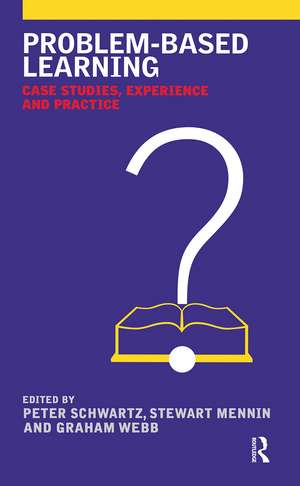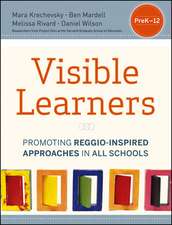Problem-based Learning
Autor Peter Schwartzen Limba Engleză Paperback – mar 2001
| Toate formatele și edițiile | Preț | Express |
|---|---|---|
| Paperback (1) | 382.65 lei 6-8 săpt. | |
| Taylor & Francis – mar 2001 | 382.65 lei 6-8 săpt. | |
| Hardback (1) | 1435.12 lei 6-8 săpt. | |
| Taylor & Francis – mar 2001 | 1435.12 lei 6-8 săpt. |
Preț: 382.65 lei
Nou
Puncte Express: 574
Preț estimativ în valută:
73.22€ • 76.65$ • 60.58£
73.22€ • 76.65$ • 60.58£
Carte tipărită la comandă
Livrare economică 05-19 aprilie
Preluare comenzi: 021 569.72.76
Specificații
ISBN-13: 9780749434922
ISBN-10: 0749434929
Pagini: 193
Dimensiuni: 156 x 234 x 11 mm
Greutate: 0.29 kg
Ediția:1
Editura: Taylor & Francis
Colecția Routledge
Locul publicării:Oxford, United Kingdom
ISBN-10: 0749434929
Pagini: 193
Dimensiuni: 156 x 234 x 11 mm
Greutate: 0.29 kg
Ediția:1
Editura: Taylor & Francis
Colecția Routledge
Locul publicării:Oxford, United Kingdom
Cuprins
1. Come and See the Real Thing: Convincing faculty members to accept a proposal to adopt Problem-based learning (PBL) within a curriculum 2. No Money Where Your Mouth Is: Resource intensity of PBL; obtaining faculty tutors in the face of competing demands 3. Into the Lion’s Den: Introducing PBL into a combined clinical teaching attachment; dealing with organizational difficulties 4. Lost in the Mêlée: Converting a traditional curriculum to a ‘hybrid’ PBL curriculum; reducing ‘overload’ in the curriculum 5. But What if They Leave with Misinformation?: Convincing skeptical faculty about ‘self correction’ mechanisms in PBL groups 6. Mixed Models and Mixed Messages: Implementing PBL during periods of administrative transition; dealing with the challenges facing students in a new curriculum which only some courses use PBL 7. Overcoming Obstacles: Achieving virtually integrated PBL curriculum in a traditional, departmentally organized medical school 8. Forward from the Retreat: Acting on a proposal to introduce PBL into a long-established, traditional medical curriculum 9. Too Little, Too Late?: The importance of group- and self-evaluation and timely feedback in PBL tutorials 10. Not More PBL: Responding to clinical students’ boredom with paper-based PBL 11. Why Do They Ignore It?: Getting Students in a PBL curriculum to pay attention to important learning issues that do not appear to them to be central 12. Redesigning PBL: Resolving the Integration Problem: Translating a PBL model from one discipline to another 13. Why Does the Department Have Professors if They Don’t Teach?: Confusion about the meaning of ‘self-directed learning’ - addressing the confusion and minimizing its effects when implementing PBL 14. Faculty Development Workshops: A ‘Challenge’ of Problem-Based Learning? 15. Dealing with difficulties during faculty development workshops on PBL resulting from participants’ different backgrounds and expectations 16. The Students Did That?: Inducting faculty members and students into a new PBL curriculum 17. Mature Students?: Difficulties in PBL process when ‘mature’ students take control of groups 18. To Admit or Not to Admit? That is the Question…: Selecting Students for PBL programmes; reconciling differing views among students of the nature and goals of PBL 19. Why Aren’t They Working?: Responding to poorly functioning tutorial groups in PBL 20. I Don’t Want to Be a Groupie: Dealing with a student who fails a PBL unit because of poor participation in the group 21. Reflecting on Assessment: Choosing a method that assesses both the knowledge gained and the learning process of PBL 22. Assessable Damage: Dealing with factors causing a student’s hostile reaction to assessment in a PBL course 23. They Just Don’t Pull Their Weight: Assuring individual accountability of students in small tutorless PBL groups
Further Reading
Index
Further Reading
Index











